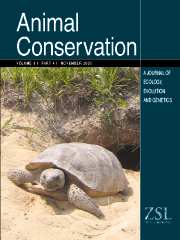Article contents
Could translocation aid hen harrier conservation in the UK?
Published online by Cambridge University Press: 04 April 2001
Abstract
Translocation is increasingly used in conservation to re-establish or augment populations of threatened species or to remove individual animals from areas of human-wildlife conflict. We assess the feasibility and utility of translocating hen harriers (Circus cyaneus) in the UK to enhance their distribution and abundance whilst simultaneously reducing the impact of harrier predation on red grouse (Lagopus lagopus scoticus) populations and shooting bags. Current knowledge of hen harrier feeding ecology, dispersal, survival and recruitment suggests that they would be suitable subjects for translocation with the aim of increasing their distribution in the UK. Assessment of habitat and food availability suggest that there are suitable recipient sites beyond the current range of the hen harrier in the UK. However, translocation would not be a sustainable method of reducing predation on grouse moors because it would have to continue indefinitely as long as grouse moors attracted harriers. Translocation of harriers to grouse moors where they have been locally extirpated would not be appropriate until levels of illegal control are reduced. Establishing new harrier populations through translocation away from grouse moors may become desirable if initiatives to reduce human-raptor conflicts on grouse moors are unsuccessful, or as an interim measure to accelerate the recovery of hen harriers in the UK.
- Type
- Research Article
- Information
- Copyright
- © 2001 The Zoological Society of London
- 13
- Cited by


